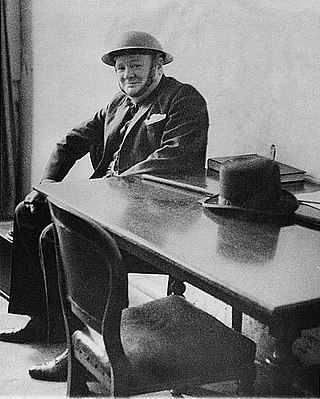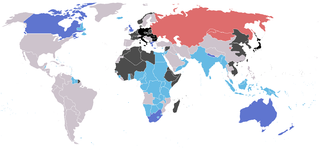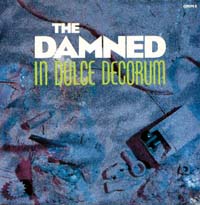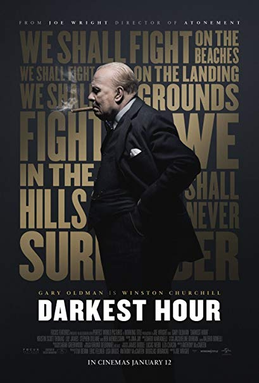
Sir Winston Leonard Spencer Churchill was a British statesman, military officer, and writer who was Prime Minister of the United Kingdom from 1940 to 1945 and again from 1951 to 1955. Apart from 1922 to 1924, he was a member of Parliament (MP) from 1900 to 1964 and represented a total of five constituencies. Ideologically an adherent to economic liberalism and imperialism, he was for most of his career a member of the Conservative Party, which he led from 1940 to 1955. He was a member of the Liberal Party from 1904 to 1924.

The Dunkirk evacuation, codenamed Operation Dynamo and also known as the Miracle of Dunkirk, or just Dunkirk, was the evacuation of more than 338,000 Allied soldiers during the Second World War from the beaches and harbour of Dunkirk, in the north of France, between 26 May and 4 June 1940. The operation commenced after large numbers of Belgian, British, and French troops were cut off and surrounded by German troops during the six-week Battle of France.

The attack on Mers-el-Kébir on 3 July 1940, during the Second World War, was a British naval attack on French Navy ships at the naval base at Mers El Kébir, near Oran, on the coast of French Algeria. The attack was the main part of Operation Catapult, a British plan to neutralise or destroy French ships to prevent them from falling into German hands after the Allied defeat in the Battle of France. The British bombardment of the base killed 1,297 French servicemen, sank a battleship and damaged five other ships, for a British loss of five aircraft shot down and two crewmen killed. The attack by air and sea was conducted by the Royal Navy, after France had signed armistices with Germany and Italy, coming into effect on 25 June.

The phrase "blood, toil, tears and sweat" became famous in a speech given by Winston Churchill to the House of Commons of the Parliament of the United Kingdom on 13 May 1940. The speech is sometimes known by that name.

The Norway Debate, sometimes called the Narvik Debate, was a momentous debate in the British House of Commons from 7 to 9 May 1940, during the Second World War. The official title of the debate, as held in the Hansard parliamentary archive, is Conduct of the War. The debate was initiated by an adjournment motion enabling the Commons to freely discuss the progress of the Norwegian campaign. The debate quickly brought to a head widespread dissatisfaction with the conduct of the war by Neville Chamberlain's government.

"We shall fight on the beaches" was a speech delivered by the British Prime Minister Winston Churchill to the House of Commons of the Parliament of the United Kingdom on 4 June 1940. This was the second of three major speeches given around the period of the Battle of France; the others are the "Blood, toil, tears and sweat" speech of 13 May 1940, and the "This was their finest hour" speech of 18 June 1940. Events developed dramatically over the five-week period, and although broadly similar in themes, each speech addressed a different military and diplomatic context.

"Never was so much owed by so many to so few" was a wartime speech delivered to the House of Commons of the United Kingdom by British prime minister Winston Churchill on 20 August 1940. The name stems from the specific line in the speech, "Never in the field of human conflict was so much owed by so many to so few", referring to the ongoing efforts of the Royal Air Force and other Allied aircrew who were fighting in the Battle of Britain, the pivotal air battle with the German Luftwaffe.

"The Darkest Hour" is a phrase used to refer to an early period of World War II, from approximately mid-1940 to mid-1941. While widely attributed to Winston Churchill, the origins of the phrase are unclear.

In May 1940, during the Second World War, the British war cabinet was split over whether to discuss peace terms with Germany or to continue fighting. Opinion on the side of continuing with the war was led by the prime minister, Winston Churchill, while the side preferring negotiation was led by the Foreign Secretary, Lord Halifax. The disagreement escalated to crisis point and threatened to bring down the Churchill government.

"In Dulce Decorum" is a song by English rock band the Damned, released on 16 November 1987 by MCA Records.
An Airman's Letter to His Mother is a 1941 documentary-style British propaganda short film directed by Michael Powell and narrated by John Gielgud and Powell.
The following events occurred in June 1940:

The Churchill war ministry was the United Kingdom's coalition government for most of the Second World War from 10 May 1940 to 23 May 1945. It was led by Winston Churchill, who was appointed prime minister of the United Kingdom by King George VI following the resignation of Neville Chamberlain in the aftermath of the Norway Debate.
British Air Forces in France (BAFF) was a Royal Air Force (RAF) Command set up on 15 January 1940 led by Air Marshal Arthur Barratt, to provide unified command of the RAF in France. When the British Expeditionary Force (BEF) went to France, the Royal Air Force Component of the British Expeditionary Force accompanied the BEF for air support and the Advanced Air Striking Force the former No. 1 Group RAF of Bomber Command, moved to airfields in eastern France for independent operations. Barratt was charged with giving "full assurance" to the BEF of air support and to provide the BEF with
...such bomber squadrons as the latter may, in consultation with him, consider necessary from time to time.
The following events occurred in May 1940:
A Total and Unmitigated Defeat was a speech by Winston Churchill in the House of Commons at Westminster on Wednesday, 5 October 1938, the third day of the Munich Agreement debate. Signed five days earlier by Prime Minister Neville Chamberlain, the agreement met the demands of Nazi Germany in respect of the Czechoslovak region of Sudetenland.
The following events occurred in January 1940:
The following is a timeline of the first premiership of Winston Churchill, who was the Prime Minister of the United Kingdom from 1940 to 1945 and again from 1951 to 1955. Churchill served as the Prime Minister of the United Kingdom during the bulk of World War II. His speeches and radio broadcasts helped inspire British resistance, especially during the difficult days of 1940–41 when the British Commonwealth and Empire stood almost alone in its active opposition to Nazi Germany. He led Britain as Prime Minister until victory over Nazi Germany had been secured.

Darkest Hour is a 2017 British biographical war drama film directed by Joe Wright and written by Anthony McCarten. It stars Gary Oldman as Winston Churchill, in his early days as Prime Minister of the United Kingdom during the Second World War and the May 1940 war cabinet crisis. The cast also includes Kristin Scott Thomas as Clementine Churchill, Lily James as Elizabeth Layton, Stephen Dillane as Viscount Halifax, Ronald Pickup as Neville Chamberlain, and Ben Mendelsohn as King George VI. The title of the film refers to a phrase describing the early days of the war, widely attributed to Churchill.

Winston Churchill was appointed First Lord of the Admiralty on 3 September 1939, the day that the United Kingdom declared war on Nazi Germany. He succeeded Neville Chamberlain as prime minister on 10 May 1940 and held the post until 26 July 1945. Out of office during the 1930s, Churchill had taken the lead in calling for British re-armament to counter the growing threat of militarism in Nazi Germany. As prime minister, he oversaw British involvement in the Allied war effort against the Axis powers. Regarded as the most important of the Allied leaders during the first half of the Second World War, Historians have long held Churchill in high regard as a victorious wartime leader who played an important role in defending Europe's liberal democracy against the spread of fascism. For his wartime leadership and for his efforts in overseeing the war effort, he has been consistently ranked both by scholars and the public as one of the top three greatest British prime ministers, often as the greatest prime minister in British history.









